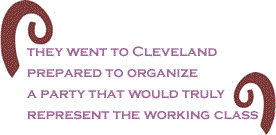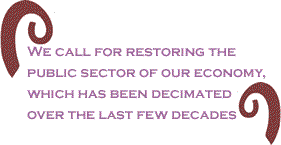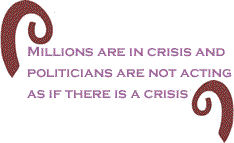Richard
Trumka, president of the AFL-CIO, earlier this month called
for a politically independent labor movement, indicating
a definite move toward cutting off organized labor�s dependence
on the political parties for advancement of wage working
Americans.
 For
many who have been involved in organized labor and the labor
movement, in general, for decades, Trumka�s new position
on politics demands the answer to one question: �Where have
you been?� For
many who have been involved in organized labor and the labor
movement, in general, for decades, Trumka�s new position
on politics demands the answer to one question: �Where have
you been?�
As
head of the largest labor federation in the U.S.,
Trumka pointed out on the federation�s website that unions
and their millions of members are largely forgotten after
the flush of the campaign and election are over. And this
happens time and again, but he put it more succinctly, a
departure for labor leaders who usually tiptoe around the
issue when speaking about this in public.
In
the first week of June, Trumka spoke at a rally of hundreds
of nurses who were in Washington to lobby for a financial transactions tax that could pay
for social services, including a single payer health care
system. �For too long,� he told the gathered nurses, �we
have been left after Election Day holding a canceled check
waving it about - �Remember us? Remember us? Remember us?�
- asking someone to pay a little attention to us. Well,
I don�t know about you, but I�ve had a snootful of that
s--t,� Trumka said to cheers.
It
was, at the least, a signal that Trumka is set to take the
unions in his federation in a different direction than the
one in which they have been going for the greater part of
a century. This is good, but it is a little late. Maybe
not too late, but late.
Twenty
years ago, Tony Mazzocchi, a leader in the then Oil, Chemical
and Atomic Workers Union, founded Labor Party Advocates,
which a few years later would lead to the formation of the
Labor Party. By 1996, the Labor Party�s founding convention
was held in Cleveland,
from which the 1,400 delegates left energized and ready
to organize wageworkers all across the country into a party
that would truly represent the people.
 Delegates
from 46 states and many unions went away from Cleveland
with a 16-point program for establishing economic justice
in the U.S. The program included: a guarantee to �universal
access to quality health care� and ensuring �everyone access
to quality public education,� putting a halt to �corporate
abuse of trade,� an amendment to the constitution to �guarantee
everyone a job at a living wage,� putting an end to �corporate
welfare as we know it,� and restoring �workers� rights to
organize, bargain, and strike.� Delegates
from 46 states and many unions went away from Cleveland
with a 16-point program for establishing economic justice
in the U.S. The program included: a guarantee to �universal
access to quality health care� and ensuring �everyone access
to quality public education,� putting a halt to �corporate
abuse of trade,� an amendment to the constitution to �guarantee
everyone a job at a living wage,� putting an end to �corporate
welfare as we know it,� and restoring �workers� rights to
organize, bargain, and strike.�
It
was a program that addressed a litany of abuses that workers
have suffered over generations, abuses that have been consolidated
by Corporate America over the past quarter-century. Included
in the program were the demands to end bigotry on the basis
of the principle that �an injury to one is an injury to
all� and a demand to �end corporate domination of elections�
and to �end corporate welfare as we know it.�
The
delegates to the founding convention included some of the
most energetic young union and community activists to be
found in the country. Most of them were active in their
own unions or they had worked closely with unions in their
own cities and towns. And they went to Cleveland
prepared to organize a party that would truly represent
the working class. They were tired of lip service from the
two major parties, but particularly the Democratic Party,
which they said had always welcomed their energy and money
in political campaigns, but abandoned the working class
when it came to protecting their livelihoods, their families,
and their communities after the votes were counted.
The
founding Labor Party convention was held in a period of
massive removal of the U.S. manufacturing and industrial
base by Corporate America.  If
the leaders of the opposition to the ruling class could
not see what was happening, the informed delegates and thousands
of their compatriots around the country did see it and were
willing to act on it. Their 16-point program and the statements
by the various caucuses and groups, as well as the speeches
from the floor, laid out the problems for American workers
and they declared their willingness to work diligently in
the coming years to change the circumstances of workers�
lives in the U.S. If
the leaders of the opposition to the ruling class could
not see what was happening, the informed delegates and thousands
of their compatriots around the country did see it and were
willing to act on it. Their 16-point program and the statements
by the various caucuses and groups, as well as the speeches
from the floor, laid out the problems for American workers
and they declared their willingness to work diligently in
the coming years to change the circumstances of workers�
lives in the U.S.
Those
who think that today�s problems did not exist two or three
decades ago should have a look at the problems and then
look at the proposals the Labor Party laid out for solving
the problems.
For
example, the delegates declared: �We call for restoring
the public sector of our economy, which has been decimated
over the last few decades. We believe this country needs
to protect the environment without making working people
take the brunt of the pain: we need a "just transition
movement" to protect both jobs and the environment.
It
is as if the founding convention of the Labor Party anticipated
the likes of Governor Scott Walker of Wisconsin
and the Republicans across the nation, who have launched
a full-scale assault against American workers and their
unions, not to mention the threat they now pose to Social
Security, Medicare, and Medicaid. The delegates declared
that the public sector had been �decimated� over a couple
of decades. How would America�s
public sector of 2011 be described by those same delegates?

The
rank-and-file of trade unionists and workers, in general,
have known where the country was headed economically for
decades, far in advance of the people in official positions.
Why was nothing done? Simply, no one seems to listen to
the people, neither the politicians, nor the union officials.
It was much easier for them to continue to rely on the Democrats,
hoping that they would do the right thing. As we�ve seen,
hope only goes so far.
It
was easier to do it that way, rather than try to start a
new party. It was an easy rhythm and it was comfortable.
They were used to talking to one another and the mechanisms
for political action were already set in stone. All that
remained to be done was to fill in the spots on the phone
banks with members and give the campaign money in accordance
with the rules. Not all, but much, of the money went to
Democrats. But then, where were working men and women to
turn? To the Republicans, who as we clearly know in 2011,
were out to cut off the working class (and the middle class)
at the knees?
Although
there were several active and effective unions, which were
part of the Labor Party structure, the larger unions, the
participation of which was vital to the formation of a party
of working people, did not so much act in a hostile manner
to the Labor Party�s founding, as pointedly ignored it.
The effect was pretty much the same as working to actively
kill it.
 If
they discussed it at all, it was in the confines of their
inner circles, away from their own rank-and-file members,
most of whom likely never heard of the Labor Party. The
death of Mazzocchi a few years later, along with the (hard
fought) decision at the subsequent constitutional convention
in Pittsburgh not to run candidates at any level until there
was a stronger, more well informed constituency, combined
to sound the death knell for the nascent party. There continue
to be a few Labor Party organizations in the country. If
they discussed it at all, it was in the confines of their
inner circles, away from their own rank-and-file members,
most of whom likely never heard of the Labor Party. The
death of Mazzocchi a few years later, along with the (hard
fought) decision at the subsequent constitutional convention
in Pittsburgh not to run candidates at any level until there
was a stronger, more well informed constituency, combined
to sound the death knell for the nascent party. There continue
to be a few Labor Party organizations in the country.
For
those who were involved in the union movement at that time
and who believed that a Labor Party might begin to solve
some of the country�s problems, Trumka�s announcement that
the federation is going to take a turn toward more political
independence is good news. How much cooperation he can expect
to receive from the major unions that could not bear to
say the words �Labor Party� 15 or 20 years ago is something
yet to be determined.
Considering
today�s problems of wage working Americans, whose representatives
in Washington seem to have abandoned them (if not attempted
to shut off all hope for a decent life), it is important
to remember that all of these problems were around for the
delegates to ponder, discuss, and debate at the Labor Party�s
convention, and long before that.
At
that time, the problems that might have been solved more
easily than they can be solved today are going to be very
difficult, since both the economic and political structures
of 2011 give workers little power to solve the problems
themselves. A Labor Party would have given them a way to
begin to solve the problems.
 Rich
Trumka may be fed up with the �benign neglect� that has
been demonstrated by the political parties over his tenure
at the AFL-CIO, but workers, union and non-union, have been
fed up with politics as usual for a lot longer. Unfortunately,
acting out of the desperation that is afoot in America
today is not as good as dealing with problems before they
become disasters. Millions are in crisis and politicians
are not acting as if there is a crisis. Rich
Trumka may be fed up with the �benign neglect� that has
been demonstrated by the political parties over his tenure
at the AFL-CIO, but workers, union and non-union, have been
fed up with politics as usual for a lot longer. Unfortunately,
acting out of the desperation that is afoot in America
today is not as good as dealing with problems before they
become disasters. Millions are in crisis and politicians
are not acting as if there is a crisis.
If
Trumka is able to move organized labor (not forgetting that
there is now a second labor federation) away from its old
ways, there may be some hope for workers who have been displaced
in the American economy and some hope for young people,
as well. How he will deal with the break without having
a political alternative like the Labor Party is another
matter. That he is taking the initiative is a good first
step, but he is walking a path that is a sharp departure
for organized labor since the dawn of the New Deal. He could
talk to the organizers of the Labor Party about the path
ahead.
As
the delegates said at the Cleveland
convention: �Our Labor Party understands that our struggle
for democracy pits us against a corporate elite that will
fight hard to retain its powers and privileges. This is
the struggle of our generation. The future of our children
and their children hangs in the balance. It is a struggle
we cannot afford to lose.�
(Disclosure:
The writer was a delegate to the founding Labor Party convention
in Cleveland.)
BlackCommentator.com
Columnist, John Funiciello, is a labor organizer and former
union organizer. His union work started when he became a
local president of The Newspaper Guild in the early 1970s.
He was a reporter for 14 years for newspapers in New York State. In
addition to labor work, he is organizing family farmers
as they struggle to stay on the land under enormous pressure
from factory food producers and land developers. Click here
to contact Mr. Funiciello. |

